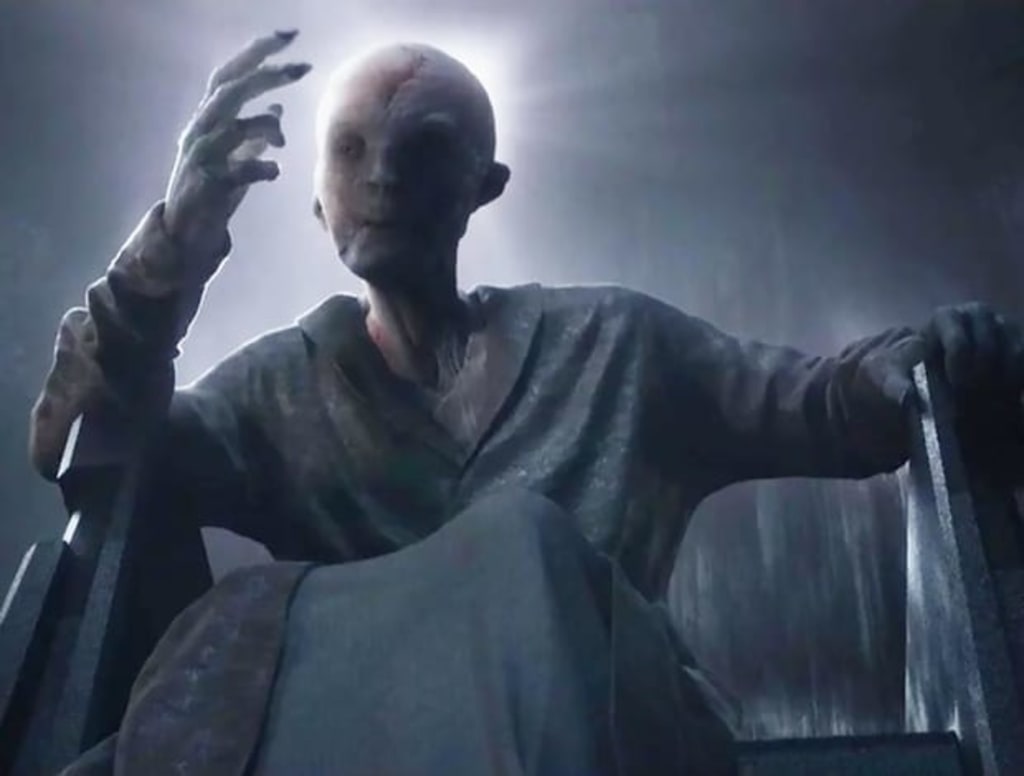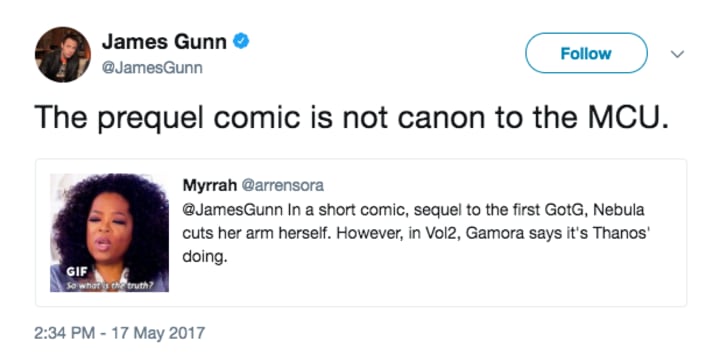
Hollywood goes through fashions, and right now the fashion is undoubtedly extended universes. Whether you're talking about Star Wars or the MCU, the DC Extended Universe or the Universal #Monsterverse, every studio wants to get in on the action.
The last few days have seen Entertainment Weekly reveal a wealth of new information about Star Wars Episode VIII: The Last Jedi, the second installment in Lucasfilm's Sequel Trilogy. They've also dropped a tantalizing hint as to how these wider universes work.
Let's Take To Twitter
JINX. pic.twitter.com/RjAm2FtVtv— Porglo Hidalgo (@pablohidalgo) August 9, 2017
One of the most important creative executives in Lucasfilm, Pablo Hidalgo, loves responding to fan questions on Twitter, and he recently made an important point:
"A good story doesn't have to answer all your questions. You're thinking of a wiki article. Which often aren't good stories."
To Hidalgo's clear amusement, director Rian Johnson made the same point when discussing Snoke's origin in The Last Jedi. Snoke is a mysterious figure, a sort of Emperor-analogue who's responsible for Kylo Ren's fall to the dark side. But Johnson insists that the villain's origin won't be an important part of his story, explaining:
"Similar to Rey’s parentage, Snoke is here to serve a function in the story. And a story is not a Wikipedia page. For example, in the original trilogy, we didn’t know anything about the Emperor except what Luke knew about him, that he’s the evil guy behind Vader. Then in the prequels, you knew everything about Palpatine because his rise to power was the story."
Let's Test The Logic
When Lucasfilm launched the Prequel Trilogy, fans were left absolutely fascinated. How did we get from Return of the Jedi, with the Empire dealt a devastating blow and the light side seemingly triumphant, to The Force Awakens? The truth is that Lucasfilm likely didn't have an answer to those questions, even behind the scenes. Their priority was to relaunch the Star Wars franchise with a powerful, evocative narrative that paid homage to A New Hope. They'd work out the details later.
Hidalgo and Johnson have a very valid point. Fans of some of the more established franchises — notably Star Wars, #StarTrek, or the #MCU — are obsessed with details. We love to know everything: how did Nick Fury lose an eye? What planet did Luke train his Jedi on? How did Kirk beat the Kobayashi Maru? But the truth is, these questions are ancillary. We only need to know the answers if they directly impact the story.
The best story-tellers know that they don't need to tell us everything. Take J. R. R. Tolkien's Lord of the Rings. Tolkien created a massive range of supporting material, a so-called legendarium, that helped him tell a story with tremendous detail. But content from the legendarium only makes its way into the main narratives if and when it becomes relevant. If you want to learn about the origin of evil in Middle Earth, or to explore the history of the Orcs? You have to go to secondary content like The Silmarillion.
The Potential This Creates
The example of Tolkien clues us in on the major opportunity this opens up for franchises: namely, the possibility for secondary materials to the main narratives. That's why you get so-called "technical manuals" supporting sci-fi franchises like Doctor Who, Star Trek, or Star Wars. These explain how the TARDIS works, give us schematics of the starships, or discuss the principles of Hyperspace travel. They're essentially useful reference books, helping to clarify the rules of the worlds we see on the big or small screens.
In general, the more time we spend in a fictional world, the more questions we're left with. And that's why shared universes have a unique potential; they become vast, sprawling things, embracing many different ideas. Take the MCU; in the one shared universe, you have the sorcery of Doctor Strange, the science-based adventures of Iron Man, and the cosmic action of Guardians of the Galaxy. Every single movie adds more to the universe, synergising with what's already there, and creating new questions to tantalize fans.

Those questions, in turn, create opportunities. Those have been exploited by Marvel Comics and Marvel Television to create ancillary shows and tie-in comics, explaining how Thor got to Earth in The Avengers, revealing how S.H.I.E.L.D. clean up sites of alien activity across the globe, or revealing the further adventures of Hayley Atwell's Agent Carter. In the early days of this wider MCU, fans were expected to invest in the TV shows and tie-in comics precisely because they answered the questions we were asking. That's why the first seasons of Agents of S.H.I.E.L.D. tied in to the films so much, and why the second Marvel TV series was Agent Carter — not Iron Fist. Even on Netflix, Marvel carefully worked to ensure the first season of Daredevil tied in with the wider world of the movies; Wilson Fisk rose to power after the battle of New York.
The same is true of Star Wars. Hidalgo and Johnson clearly don't intend Snoke's backstory to be a major part of The Last Jedi, and even in Episode IX, it will only be revealed to the extent that it's relevant to the story. But you can bet your bottom dollar the wider Star Wars franchise — the novels, comics, and TV shows — will tell this tale. They know that we'll end up with unanswered questions about how the galaxy transitioned from Return of the Jedi to The Force Awakens, and these other mediums will be used to explore the answers.
The Risks This Creates
Cast your eyes back to the MCU, though, and it's easy to recognize the risk this creates. Attentive readers noticed that Guardians of the Galaxy Vol. 2 directly contradicted some of the ancillary material; a tie-in comic had given a very different backstory for Nebula and Gamora. Writer / director James Gunn gave a simple response; he declared that specific tie-in was not canon.

It's the same problem Lucasfilm faced back in 1999, when George Lucas launched the Prequel Trilogy, or again as they prepared to relaunch the franchise after they were bought by Disney. The secondary material — the tie-in comics and TV shows — are all well and good, but they should never restrict the primary material. In the case of Star Wars, Lucasfilm branded all previous Expanded Universe content non-canon, giving themselves new freedom to create fresh movies. It makes sense; by the time Disney purchased Lucasfilm in 2012, the old Expanded Universe had literally charted the galaxy's story up to a hundred years after A New Hope.
The best franchises manage these risks carefully. In the case of Lucasfilm, the much-vaunted Story Group is carefully developing the ongoing narrative. As a result, Lucasfilm actually considers its comics and novels to be equally as canonical as its movies. In contrast, Marvel is finding matters a little more difficult; with the film and TV / comics sides separated in a corporate restructure back in 2015, it's difficult for them to coordinate properly. There are signs things are improving, though, with Marvel Television's ever-growing slate, and the promise of some fantastic tie-in comics for next year's Black Panther and Infinity War.
Still, Hidalgo and Johnson's point stands. Fans of these shared universes need to take a step back and understand that no story tells you everything; it only ever tells you that which is relevant. How did the Time Stone get to Earth, and how did Agamotto get it? What happened to the Abomination after The Incredible Hulk? Who are the Guardians of the Whills, and why do they venerate the Temple City of Jedha? It's true that the answers to these questions may well be given in later movies, but if they're not — that's fine. These unanswered questions in themselves create the potential for the shared universes to continue growing in other mediums. And that's something we should celebrate.
About the Creator
Tom Bacon
A prolific writer and film fan, Tom has a deep love of the superhero genre.






Comments
There are no comments for this story
Be the first to respond and start the conversation.